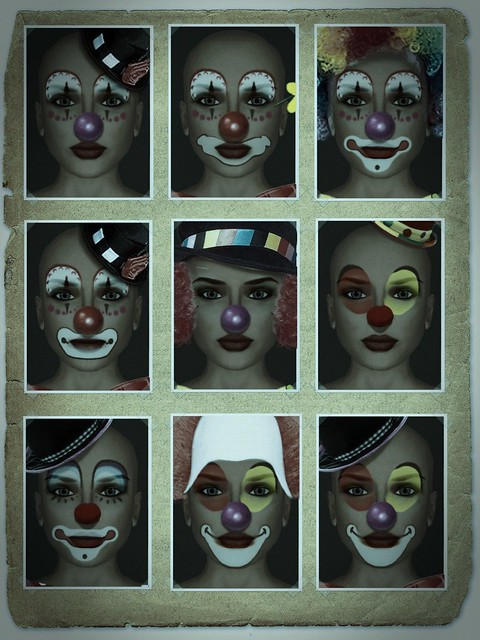Soror Nishi posted a rant yesterday about misuse of the word "identity" by people discussing the topic in relation to virtual worlds. After writing more than 100 posts related to identity over the past few years, the primary question that still holds interest for me is this:
How do the beliefs we hold about who and what we are
impact the way we live our lives?
I could have just stopped there, but wanted to add a few thoughts related to Soror's post . . .
If we look deeply into the sentient being we experience as a unique identity, it becomes clear that little has been constant over the course of any person's life. For instance, at fifty years of age there is only the slightest remnant left of the physical, mental and emotional aspects that comprised a person when they were two years old.
So although I agree with Soror that, "Your Self and your Identity you are stuck with, and you only ever have one of each . . .", it is only from the perspective that we don't have multiple instances of our selves walking around simultaneously and interacting independently of each other. Practically speaking, I find it more useful to think of myself as an ever-changing malleable web of thoughts, feelings and form that expresses multiple identities, not only from decade to decade, but from moment to moment.
Of course, this is a deep, important, complex and mysterious subject that can not be covered in a single book, little alone a short post. But my intention in this blog is not to hack into the ultimate reality of identity, but instead to think about how virtual identity can contribute to the actualization of human potential and happiness.
So although I agree with Soror that, "Your Self and your Identity you are stuck with, and you only ever have one of each . . .", it is only from the perspective that we don't have multiple instances of our selves walking around simultaneously and interacting independently of each other. Practically speaking, I find it more useful to think of myself as an ever-changing malleable web of thoughts, feelings and form that expresses multiple identities, not only from decade to decade, but from moment to moment.
Of course, this is a deep, important, complex and mysterious subject that can not be covered in a single book, little alone a short post. But my intention in this blog is not to hack into the ultimate reality of identity, but instead to think about how virtual identity can contribute to the actualization of human potential and happiness.


8 comments:
The image is excellent, again your art has expressed a whole chapter in this ongoing quest.
Thanks. Over the past month I've been moved more to visual and multi-media posts vs. prose.
Soro wrote: "an actor doesn’t change his identity when he plays Hamlet, he may try to identify with that role, but he will have the same Identity and personality when the play finishes as he did at the start".
But in Rita Carter's book 'Multiplicity' she includes the following case study:
"The actor David Suchet had a long stage run in Timon of Athens during which he found it increasingly difficult to flip back to his own major when the nightly performance ended. One evening a psychiatrist friend visited him backstage and observed that he still seemed to be acting like Timon. Suchet dismissed his concern, at which point the psychiatrist shot him a number of questions such as: ages of your children? Phone number? Date of birth?. To his consternation, Suchet found he had to work hard to retrieve the answers- the 'Timon' personality he had created was so firmly in charge that his major's memories were temporarily irretrievable'.
As for the comment " you only ever have one of each.... by definition", it completely disregards the evidence for co-consciousness that neuroscience and psychology has uncovered. An essay of mine covered the neuroscientific and psychological evidence for multiple identities:
http://extropiadasilva.wordpress.com/category/philosophies-of-self/page/2/
Ooops wrong link!
Well, it is Alt! Who Goes There Part 3 that I was referring to.
Extropia: I think that we all may be disagreeing more about semantics than the types of processes you describe.
@Extropia: There is also Vincent Price's story of being trapped in the Prince of Denmark's head after a very long run of Hamlet. He rented an isolated cottage on the moors and spent several months "deprogramming."
I also somewhat disagree with soror; I know she has studied Jung as I have, and I have additionally been luckly enough to work with some excellent Jungians at the Institute in LA.
Most people are a collection of personas, some more dominant than others, often giving the illusion of a unified self. There are "constellations" which make up the dominant ego and are fairly constant. As one ages and gains experience the smaller, sideband personas integrate into the larger extropic personality.
"Who am I?" is such an ancient question; what exactly is "identity"? Fascinating stuff :)
I think you also have to factor in the unreliability of memory; when we think about what we were like in the past our recollection will be subject to conscious and unconscious modification by our present selves.
We each have an internal Ministry of Truth, which manipulates our memories into a narrative, to maintain the illusion that our lives have purpose, direction, and ultimately meaning, rather than just being a series of responses to immediate circumstances.
To think we have stable, unchanging, core identities is about as accurate as saying that Oceania is at war with Eastasia, and has always been at war with Eastasia.
Johnny: That reminds me of a great bit from the Simpsons. Marge tells Homer he's going to regret not spending more time with his kids some day. He says: "That's a problem for future Homer. Man, I don't envy that guy."
Post a Comment